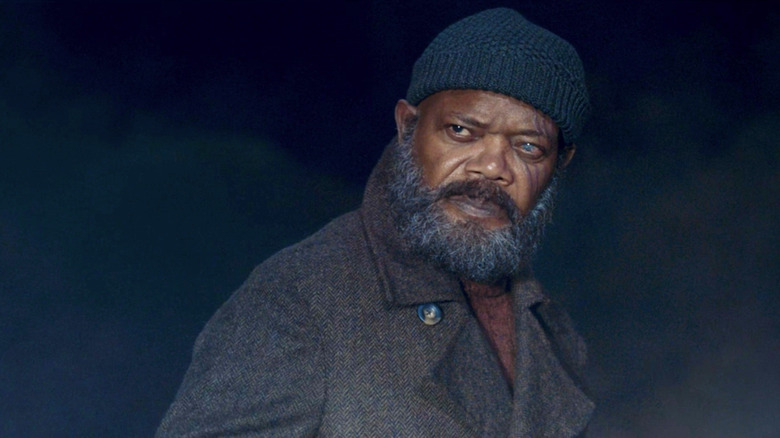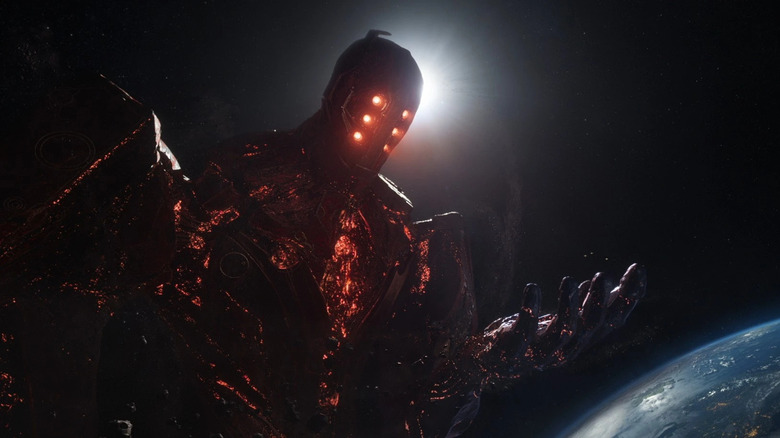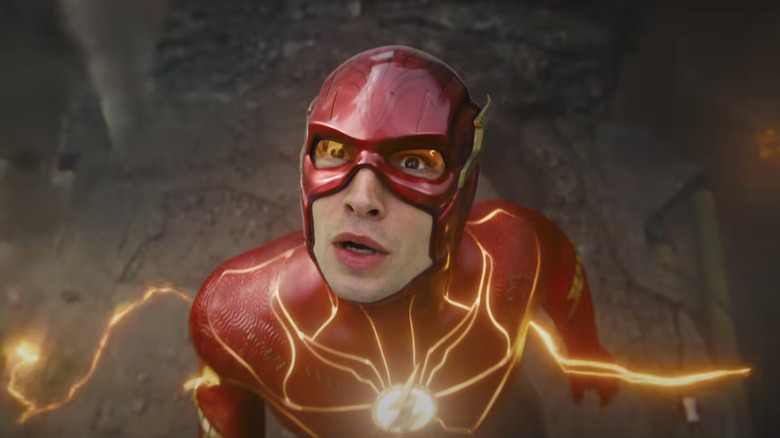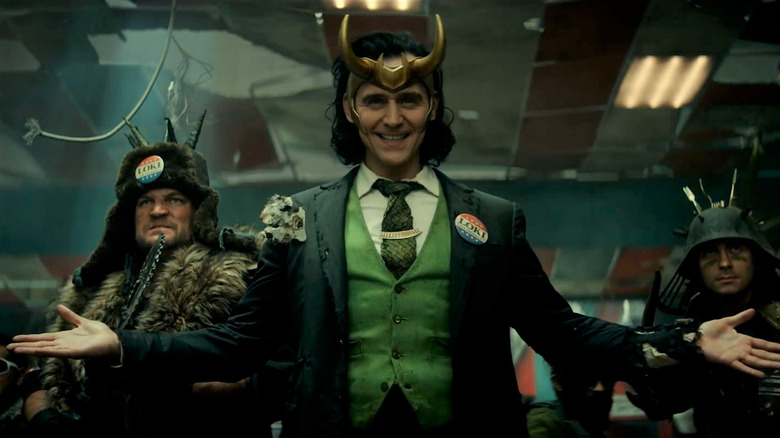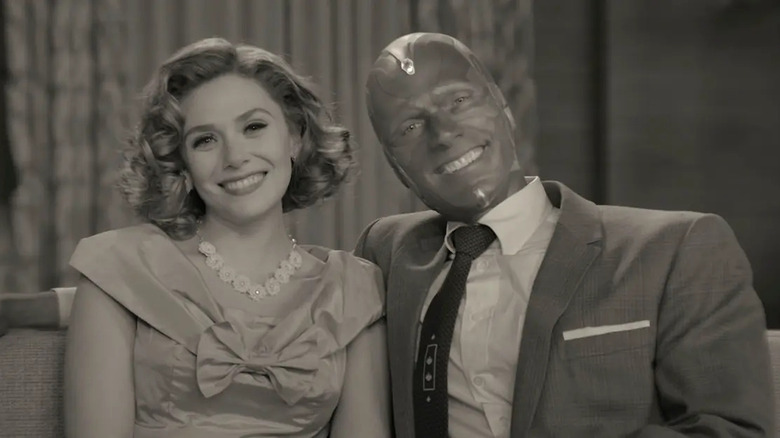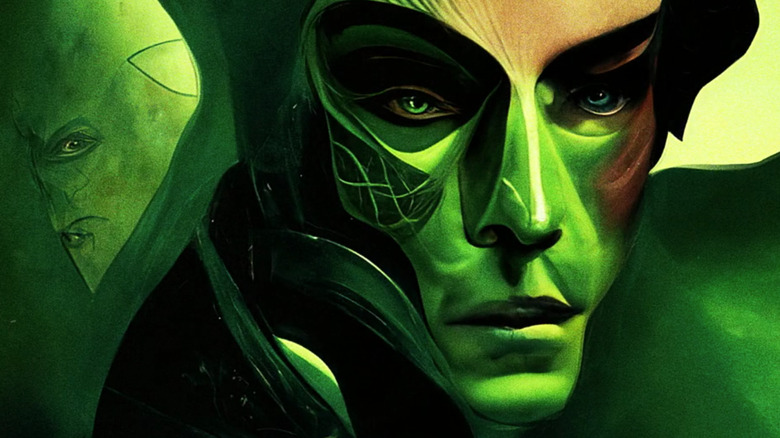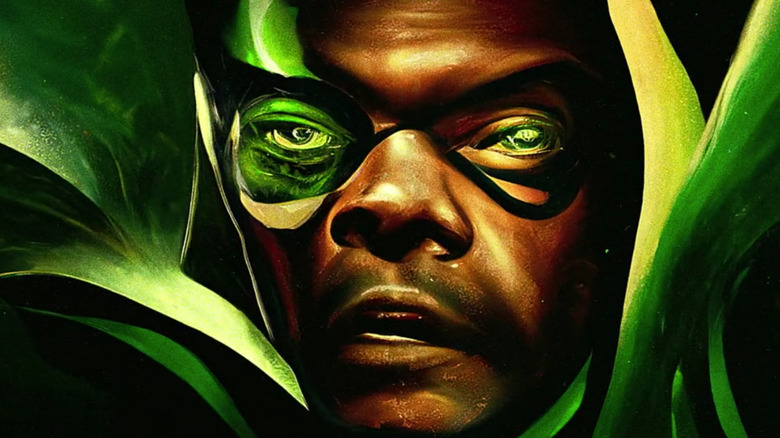Why Does Secret Invasion Have Some Of The Worst Ratings For An MCU Show? An Investigation
This article contains spoilers for "Secret Invasion."
"Secret Invasion," the latest chapter in the Marvel Cinematic Universe, has arrived — with a whimper. According to Samba TV (a technology firm specializing in television audience analytics), the viewership for the "Secret Invasion" premiere during its first five days of release (June 21-25) was 994 thousand. This is the second worst showing for an MCU show on Disney+, ahead of only "Ms. Marvel" at 775 thousand.
Samba TV has tracked all the previous MCU Disney+ premieres with the same metrics. "Loki" had by far the largest audience, with 2.5 million viewers during its first five days. This makes sense; Tom Hiddleston's Loki has always been a fan favorite (particularly a fangirl favorite). After Loki's seeming death in "Avengers: Infinity War," these fans were eager to see more of the God of Mischief.
"Moon Knight" and "Falcon and the Winter Soldier" were next, tying at 1.8 million viewers. They might have been successful for the opposite reason; the former had the novelty of a new hero (played by the delightful Oscar Isaac), and the latter starred old favorites (Sebastian Stan's Bucky Barnes, like Loki, has a devoted following). "WandaVision" had 1.6 million viewers — it was the first of the series to premiere (in January 2021). Plus, between the Emmy nominations and personal anecdotes, I'd say "WandaVision" was the one with staying power.
Next was "Hawkeye" at 1.5 million viewers — Clint has always been the lightweight of the Avengers. "She-Hulk" likewise earned 1.4 million viewers within four days of release. All-in-all though, these returns are consistent. The only outlier is "Loki," which trended upward compared to the rest. Why has "Secret Invasion" fallen behind?
MCU fatigue
Ever since "Avengers: Endgame" didn't live up to its title, there's a sense that audiences have been getting tired of the interminable Marvel Cinematic Universe. The last one to crack a billion dollars at the box office was "Spider-Man: No Way Home." Kids who grew up watching the Sam Raimi/Tobey Maguire Spider-Man movies had the purchasing power in 2021 to boost "No Way Home."
In Phase 4, the storytelling got more aimless and inconsistent than ever as Marvel dug increasingly deeper into their roster, trying to turn C-Listers into stars. In other words, it was clearer than ever that Marvel movies were being made just to keep the brand and profits alive. "The Eternals" was the first MCU movie panned by critics, earning 47 percent on Rotten Tomatoes when even acknowledged mediocrities like "Iron Man 2" and "Thor: The Dark World" skated by with "Fresh" scores. "Ant-Man and the Wasp: Quantumania," meant to herald Phase 5, continued this streak with a 46 percent on Rotten Tomatoes.
The Disney+ Marvel shows haven't helped ease the exhaustion, since they've only added to the glut. All of them seem to suffer from "six-hour movie syndrome" that so often plagues streaming programs. While Disney+ was smart enough to do weekly releases of episodes versus dumping them all at once, the fact is that following these shows is much more of a time commitment than keeping up with just the MCU movies. If the viewership results are to be believed, some people just don't want to bother, and "Secret Invasion" is reaping the consequences.
Superhero fatigue
It's not just Marvel Studios that's in an uncertain place right now, the whole superhero movie genre is. Marvel's perennial rivals, DC Comics owned by Warner Bros., have been releasing bomb after bomb. "Black Adam" did change the hierarchy of power in the DC Universe — just not in the way Dwayne Johnson boasted it would. The movie's mere $393 million intake meant any plans for sequels were forestalled. "Shazam! Fury of the Gods" earned an all-time bad gross of $134 million. And now "The Flash," still in theaters when "Secret Invasion" premiered, earned only $55 million in its opening weekend and dropped off 72 percent the following weekend.
It should be clear that audiences won't go see a movie or watch a TV show just because a superhero is in it — even if it's one they recognize like Michael Keaton's Batman. On the flip side, "Spider-Man: Across The Spider-Verse," proof there can still be a creative spark in superhero movies, has been successful box office-wise. Producer Chris Miller told Rolling Stone that, "I don't believe it's superhero fatigue, I believe it's 'a movie that feels like a movie I've seen a dozen times before' fatigue."
Superhero media has to prove it is capable of telling different stories to win people back; "Secret Invasion" might have simply come out at the wrong time for the wrong audience.
Who are the stars?
Samuel L. Jackson is a movie star, no two ways about it. In fact, he's been consistently ranked as the highest-grossing leading actor of all time. However, let's contextualize Nick Fury's role in this franchise. He's a supporting player, the glue that holds the Marvel Cinematic Universe together, not the star. His characterization is also wrapped up in Jackson's screen persona (considering the part was always going to be his, no matter what), so he doesn't have a devoted fandom the way that, say, Loki and Bucky do.
"Secret Invasion" is the first time Fury's the lead, but maybe audiences are so used to seeing him that this isn't enough of a draw. Likewise, Maria Hill (Cobie Smulders); she's always been even more of a background presence than even Fury, little more than his loyal sidekick. Smulders has goodwill left over from "How I Met Your Mother," but I'd be willing to guess casual audiences can't even recall Hill's name. Thus, her death at the premiere's end rings hollow except for the Marvel devout.
It should be noted, however, that Samba TV found that Black households were the most "over-indexed" in "Secret Invasion" viewership numbers. "Secret Invasion" is the second MCU Disney+ show where a Black man has top billing and it seems that was enough of a draw to spike interest across Black audiences.
It's also worth noting that the only show with lower viewership numbers was "Ms. Marvel" — both that and "Secret Invasion" were spun out of 2019's "Captain Marvel," with "Invasion" continuing on from the Skrull plotline of that film. "Captain Marvel" was plenty successful, earning over $1 billion, but it's possible the movie was too Johnny-come-lately to build up an enduring fanbase like other MCU properties maintain.
The pandemic lockdown is over
"WandaVision" premiered, and became a sensation, when the COVID-19 pandemic was still new. People were staying indoors and, unsurprisingly, watching TV. The series arrived just when people needed something to distract them. Plus, Marvel fans had gone without a new movie since "Spider-Man: Far From Home" in July 2019, so they had all the more incentive to tune in and catch back up with their favorite fictional world.
A Covid vaccine has since been developed and even if the disease is still with us, the State of Emergency in the United States has been lifted. Even many of the health-observant have gone back to their normal lives, which means less time for watching TV. In the age of streaming, prioritization is necessary due to the unending glut of new, acclaimed TV, and "Secret Invasion" doesn't appear to be high on people's priority lists. Why not?
Well, with movie theaters having reopened since 2021, the Marvel drought is long behind us. Plus, many people who have watched the show aren't exactly raving either.
So-so word of mouth
It's not just the viewership where "Secret Invasion" is struggling; reviews haven't been setting the world on fire. The series has only 63 percent on Rotten Tomatoes, resting on the line between "Fresh" and "Rotten." This suggests critics are largely divided on whether the series is a pass or fail. /Film's Josh Spiegel had good things to say about the series' first two episodes. However, Kelly Lawler, writing for USA Today, panned the series as a self-serious mess that its talented actors fail to save:
"'[Secret] Invasion' is a collection of moods, not stories or characters. Fight scenes race ahead of any dialogue explaining them, faces jump in and out of the story without establishing a lick of background [...] 'Invasion' is emblematic of the problem of modern-day Marvel: It's a franchise full of waste."
Kaiya Shunyata, writing for RogerEbert.com, called the series, "an overworked cog continuously turning in a withered machine." Divided reviews aren't enough of an endorsement to be convincing. Speaking of word of mouth...
The AI opening started the series off on the wrong foot
In case you haven't heard, the disgustingly ugly title sequence of "Secret Invasion" is composed of AI-generated content disguised as art; the text-to-image work was done by Method Studios. Director and executive producer Ali Selim argued it was a thematically fitting decision, telling Polygon the artificiality of the opening reflects the disguised Skrulls: "It just came right out of the shape-shifting, Skrull world identity, you know? 'Who did this?' 'Who is this?'"
This defense holds little water; plenty of human artists can conjure uncanny visuals like in the opening. It's especially galling as screenwriters are currently striking in part to hold back the existential threat AI poses to entertainment industry careers. Using AI can only read as another sign of disrespect by management to the writers and artists who prop up Marvel — the company has a long history of doing so.
The "Secret Invasion" title sequence was rightfully castigated by commentators, professional and otherwise, and earned the series bad publicity right off the bat. As much as I would wish this to be the reason for the struggling ratings, it's probably just another piece of the puzzle and not a huge one at that.
But be warned, Marvel Studios. Audiences are tuning out of your stories because of how boilerplate they've become. Asking a machine for a solution is no answer at all.
"Secret Invasion" is streaming on Disney+.
